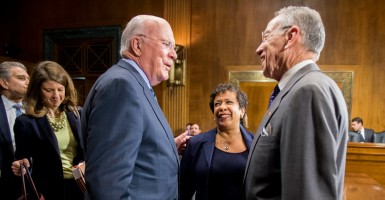A Senate Judiciary Committee hearing turned into a slugfest Thursday as Republicans and Democrats traded jabs over the GOP’s blockade of President Obama’s nominee for the Supreme Court.
Judiciary Chairman Chuck Grassley, R-Iowa, accused Senate Democrats of allowing “raw politics to infect the process” by stirring up a frivolous partisan fight.
“Everybody knows any nominee submitted in the middle of this presidential campaign isn’t getting confirmed. Everyone knows that. Why the charade?” Grassley asked.
“It’s because the other side is committed to using this process to score as many political points as possible. That’s it, plain and simple,” Grassley answered.
The White House has floated several potential nominees in the past few weeks, and Obama is expected to announce his final pick soon. But that doesn’t change much for Senate Republicans.
Since Justice Antonin Scalia died unexpectedly Feb. 13, the GOP has remained adamant that his seat on the bench remain open until after the November election, for the next president to fill.
If Republicans succeed, “the work of the committee and this Congress will be shamefully incomplete,” Sen. Chuck Schumer, D-N.Y., said.
Democrats continue to blast Republicans for dereliction of their constitutional duty to offer advice and consent on judicial nominees. They want Obama to nominate and the Senate to consider a nominee as soon as possible.
Republicans have been quick to counter that they’re only following a precedent established by Vice President Joe Biden. While a senator, Biden urged the Senate to block any of President George H.W. Bush’s Supreme Court picks before the 1992 general election.
Schumer characterized that back-and-forth as “he said, she said” dribble.
“On both sides, everyone’s said a bunch of things,” Schumer said. “But let me repeat: Not once since this committee began holding hearings on Supreme Court nominees a century ago has the committee refused to report a nominee to the floor for consideration.”
To make his point, Schumer goaded Sen. Thom Tillis, R-N.C., who also sits on the Judiciary Committee, for saying he enjoys a “good scrap” in a Senate floor speech last week.
“After the president makes a nomination,” Schumer said, “let’s have the kind of serious, long, detailed, thorough debate—call it a scrap if you will—that we’ve had in the past.”
Past remarks of the third-ranking Democrat have provided Republicans with plenty of ammunition. In July 2007, Schumer called on the Senate to block any of President George W. Bush’s Supreme Court nominees. Democrats controlled the chamber at that time, and 18 months remained in Bush’s term.
Sen. Lindsey Graham, R-S.C., predicted that the current fight will generate a permanent standard, one “that will stand the test of time.”
“We are setting a precedent here today, Republicans are,” Graham said. In the last year of a president’s term, he said, “you’re not going to fill the vacancy of the Supreme Court based on what we’re doing here today. That’s going to be the new rule.”
Graham, who voted to confirm both of Obama’s previous nominees, Elena Kagan and Sonia Sotomayor, encouraged Democrats to hold Republicans to that standard in the future.
“You could use my words against me, and you’d be absolutely right,” he said.
Bipartisan criticism swiftly poured in after the committee meeting ended.
Carrie Severino, chief counsel of the conservative Judicial Crisis Network, praised Grassley for letting “the people decide the next justice through their votes for president.”
Wade Henderson, president of the liberal Leadership Conference on Civil and Human Rights, said it would “be refreshing to see the Senate Judiciary Committee embrace its constitutional duty to advise and consent on judicial nominees.”

























